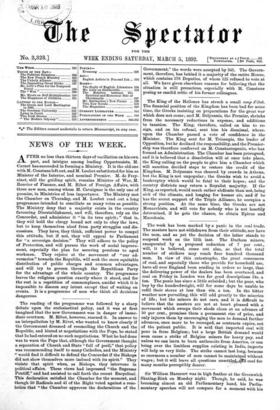The reading of the programme was followed by a sharp
debate upon the ecclesiastical policy, and it was at first imagined that the new Government was in danger of imme- diate overturn. M. Ribot, however, rescued it. In answer to an interpellation by M. Rivet, who wanted to know clearly if the Government dreamed of reconciling the Church and the Republic, and hinted at negotiations with the Pope, he stated that he had entered on no such negotiations. What he had done was to warn the Pope that, although the Government thought a separation of Church and State " full of peril," that policy was recommending itself to many Catholics, and the Ministry " would find it difficult to defend the Concordat if the Bishops did not show themselves more imbued with its spirit." They violate that spirit when, as Bishops, they intervene in political affairs. These views had impressed "the Supreme Pontiff," and had assisted to call forth the recent Encyclical. This declaration satisfied the Chamber for the moment, and though 50 Radicals and 41 of the Right voted against a reso- lution that " the Chamber approves the declarations of the Government," the words were accepted by 341. The Govern- ment, therefore, has behind it a majority of the entire House, which contains 576 Deputies, of whom 125 refused to vote at all. We have given elsewhere reasons for believing that the situation is still precarious, especially with M. Constans posing as candid critic of his former colleagues.


































